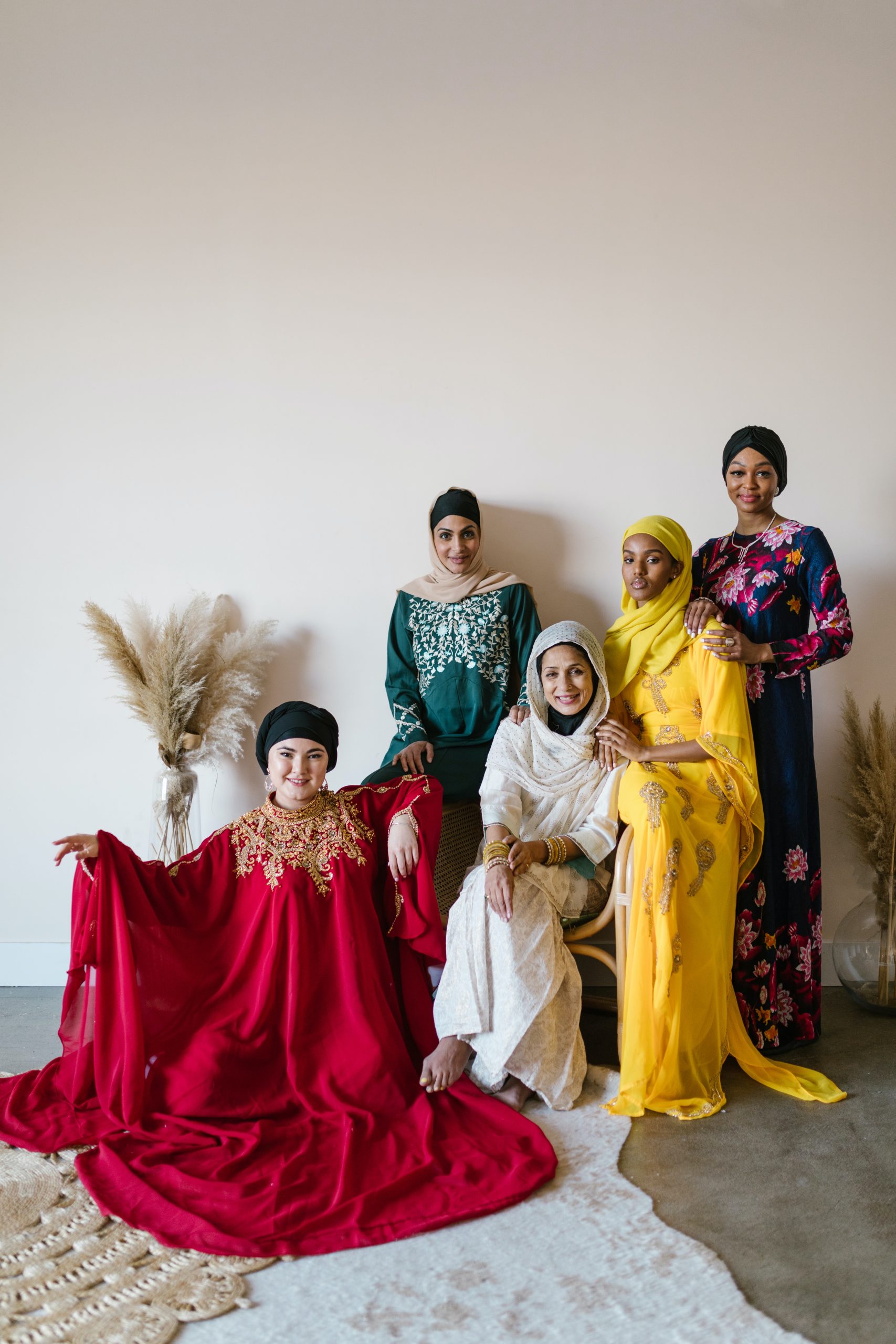From looking for the best place to pray night prayers to waking up to the smell of fresh food for Suhur, one thing has remained constant for Muslim women across the world – the need to improve ourselves and grow spiritually. As we get deeper into the spirit of Ramadan, Our feature editor, Fadilah Ali interviewed several Muslim women on their experiences, challenges and practices in the holy month and here’s what each of them had to say:
Maryam, Nigeria
As a working mother of four, I have little time on my hands. So I end up being consistent in doing the little acts of worship I’m able to do. Ramadan during the lockdown was my best in eleven years because my husband who only comes home during weekends was available throughout the month. The tranquility that comes with tahajjud brings me the most joy. I used to go to a mosque before I had kids but after that, it became difficult because taking the kids with me wasn’t a good idea. I get really tired after iftar so most times, I wake up later at night for the prayer.
I’ve learnt to make eid preparations for myself. I cook just a dish for my family and outsource snacks for my guests. Then I bake cupcakes for the children in my husband’s family as we hold a reunion during eid.
Maymunah, United Kingdom
The aspects of Ramadan that give me the most joy is the family time. During the lockdown, it felt a lot more joyful, enjoying ibaadah and the time we spent together. The challenges in Ramadan are (other than sleep) are the struggles at school and university. With all the deadlines, exams and PE back in the day, teachers were more often than not unsympathetic so it was a real struggle keeping up at the same pace, and doing your ibaadah and fasting.
I’ve never actually experienced much of mosques during Ramadan. Where I live, there aren’t any big mosques that cater well for women, except for one. I went to one iftar and it was nice to be around other people. Our eid prep starts very early! Usually we’ll make sure the big thing (clothes/presents) are done well before Ramadan. The first actual prep we do is the present wrapping, and that’s mine and my mum’s job maybe after the 15th fast onwards. We barricade ourselves into my room and wrap the presents which is a lot of fun. We like to spend as much of eid as possible actually with our family, so the bigger cleaning jobs we do maybe three days before eid. We also do a lot of food prep then as well, iron the outfits and make sure everything is sorted. A day or two before eid we decorate the living room, and the night before, we always put henna on our hands.
Mandi, United States
I delve into my work a little more; I work as a nursing practitioner for a low-income clinic and I help people who are experiencing homelessness, low income people and others who have been marginalized. I try to work on my patience and empathy, and those who are experiencing thirst and hunger in a literal way as well as those who are ‘hungry’ in their longing for acceptance, their struggles with addiction, and mental health. I try to use this to re-live Islamic stories and histories with my kids. We really try to limit our screen time by picking up more books by Muslim authors. I usually try to learn a new Surah during Ramadan and work on incorporating the healthiest foods we can.
This Ramadan, I will be mourning those friends and family lost to COVID and for other reasons, those we can’t share meals with. I will try to remember that faith lives in our hearts and your home is also a place to worship in, and maybe part of this pandemic is to remember that bringing your reflections home and prayer at home has its blessings, too, and that Taraweeh doesn’t have to happen in a mosque.
The isolation for me is pretty hard. I am already far from a lot of our family and not being able to share iftar is really depressing. I live with ADHD and depression and the isolation can be kind of destabilizing. So I try really hard to engage in dhikr, and I reschedule when I take my medications to make sure I still have that support. I try to take time to exercise, even just a little, because that has such a benefit. I tend to stretch myself very thin and this year I’m hoping to stay within my limits and remember that there’s blessing and charity in taking care of yourself as well.
Eid celebrations in the past have been – going to prayer with family and then we start at my sister-in-law’s house. My husband and I usually organize a craft project for the kids like painting or assembling something, and often we take the kids to the movies. If there is a local festival at the masjid or theme park, we always try to take the kids.
Mariam, United States
Ramadan is a time where I get to reflect and try to remember what’s important in deen and dunya and have them synced. Last year was very different because in the US nobody knew what was going to happen. Well we didn’t get to do much last year for eid, but usually we wake up early to finish the cooking, get ready, pray Eid namaz at the masjid and have some donuts then go home and have an open house. Everyone comes over and eats. By 4pm, everyone’s gone. My parents and sometimes me will go over somebody’s house that has invited us over but I’m usually really sleepy by then so I might just take a nap.
Last year we couldn’t because the mosques were shut down, obviously, and this year, it’s only partially open to men. So I prayed and will likely pray taraweeh at home. Before COVID I would try to go every couple days and either stay for 8 or the whole way through (20 rakats and witr). One of my friends who memorized the whole Quran actually used to lead my mom, sister and her mom and sisters at home but then she got married and moved. I miss those days.
Sumaya, United Kingdom
Ramadan has a vibe in the air. It’s not entirely describable but there’s an atmosphere of serenity and comfort. It’s the things like watching the taraweeh in Makkah while I make Iftar, staying up longer in the night, making little lantern jars, the atmosphere of catching up with friends and family, then the anticipation of the last 10 days, when every night you wait for laylatul-qadr, then the final prepping for eid.
For me, I worked the past Ramadan and I’ll do so this Ramadan. The biggest thing I miss is taraweeh but most mosques aren’t holding it. Usually I make a quick iftar to go, my diet goes down every Ramadan and I get heart burns from the increasing fried food that I order. When I used to spend Ramadan at home, we used to cook as a family. It’s lonelier now, but I’m going to decorate my place so I don’t feel too bad about it. I’ll have iftar at work, I made friends with a cleaning lady that swings by the office so we plan to break fast together in sha Allah.
For me eid preparations start around mid-Ramadan, that’s choosing who I will spend Eid with and how many people will show up. Then over the consecutive days, I usually do online shopping for my siblings. Then in the last two days of Ramadan, of course we have to do increasing Ibaadah, but in my household we start baking eid biscuits. The last eve of Ramadan, however, is spent in contemplation because we don’t know if we’ll witness another Ramadan so it’s like trying to savour the last few hours before sundown by making duas and supplicating. The kids get money in an envelope called idayah. As for me, I need to give zakat before salah.
Rahima, Nigeria
Ramadan is a period I always look forward to; the joy, excitement, serenity that comes with this glorious month is amazing. I try to maximize my act of worship, increase my tahajjud, salatu-duha, recite the Quran more, etc. My main challenge is with eating sahur, but I always try to earn the reward by drinking water or pap.
Fausat, Nigeria
Suhur time is quite a challenge so I prepare the next day’s sahur after iftar. For Eid, if we aren’t spending Eid with in-laws, I try to limit cooking to what I can handle, since Eid celebration is 3 days. I try to make easy and delicious recipes to prepare. That way I can also enjoy eid.




